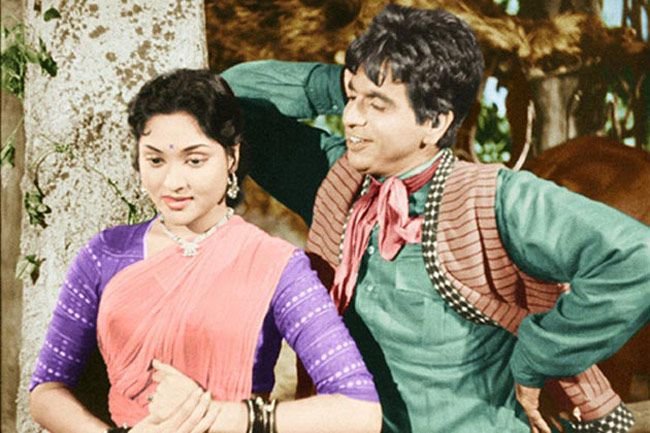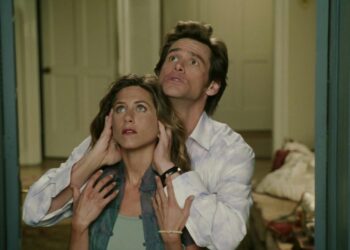The doomed lover was a million women’s fantasy man. He went on to besiege a million hearts after constantly losing in love. His soul turbulence was seen in his eyes. The black lashes matched the shadows inside. His smooth voice, tinged with melancholy, reflected the weight of his heart, “Had Shakespeare met Dilip Kumar, he would have added one more character to the already well-defined ones he had created,” said filmmaker V Shantaram.
Dilip Kumar’s portrayal of despair and loss is one of the most elegiac. He infused poetry into cinematic language, fine-tuning the vocabulary of sensuality. His heroines relished the opportunity to be wooed by him, which catapulted them into the hall of fame.
Even his later silver loves with Raakhee (Shakti), and Nutan (Karma) were filled with complexities. He celebrated his 98th birthday last December, and as he left us today, we would like to revisit his unforgettable onscreen pairing, the emotions they prompted, and occasionally the laughs they brought to remember the good old days.
Table of Contents
Nimmi and Dilip Kumar
In the 1950s, Nimmi and Dilip Kumar appeared in five films: Aan, Amar, Deedar, Daag, and Uran Khatola. In an interview with Filmfare, she emphasized the charm of his personality, saying, “God has blessed Dilip Saab with a maqnatis (magnet).

Everyone got pulled towards him. I was also pulled towards him. Mujhe bhi who bahut pasand the. Unke aashiq hum bhi the.
I was his fan too; beautiful women like Madhubala and others were in love with him. How could I ever be at par with them? I’d have been left heartbroken had I desired something unattainable.”
Meena Kumari and Dilip Kumar
Dilip Kumar and Meena Kumari were renowned in Hindi cinema as the “Tragedy King” and “Tragedy Queen,” respectively. However, in Azaad (1955) and Kohinoor (1960), the two reversed roles and played lively characters.
Dilip was recommended to undertake light-hearted movies as therapy because of his grief fixation.
In his book, Dilip says, “I enjoyed the making of Kohinnoor also for the camaraderie that grew between Meena Kumari and me after Azaad as we, who were known for our forte with emotional drama and tragedy, came together for another light-hearted film.”
Vyjayanthimala and Dilip Kumar
Devdas (1955), Naya Daur (1957), Madhumati (1958), Paigham (1959), Gunga Jumna (1961), Leader (1964), and Sunghursh (1965) were among the seven films in which Dilip Kumar appeared alongside Vyjayanthimala (1968). Devdas-Chandramukhi (Devdas), Anand-Madhumati (Madhumati), and Gungaram-Dhanno (Gunga Jumna) were epic romance material.

Devdas tells Chandramukhi, “Kaun kambakht bardasht karne ke liye peeta hai.” The Devdas-Chandramukhi equation, which was repeated in other films, including Muqaddar Ka Sikandar, became legendary not just because of Dilip’s dialogue, but also because of the Devdas-Chandramukhi equation.
Rumors of an off-screen romance arose due to the pair’s onscreen connection, which both denied. Due to Vyjayanthimala’s apparent friendship with Dilip’s rival Raj Kapoor, there was soon a rift between them. Sunghursh was their last work together (1968). After that, they didn’t talk to each other for years, according to reports.
Nargis and Dilip Kumar
Nargis starred in seven films with Dilip Kumar, beginning from Anokha Pyar (1948) to Deedar (1998). (1951). In movie after movie, her zeal equaled his. They played childhood sweethearts parted by circumstance in Mela (1948).
Andaz (1949), directed by Mehboob Khan and starring Nargis, Dilip, and Raj, was a homage to unrequited love. Babul (1950) was a melodrama about miscommunication and catastrophe, while Kidar Sharma’s Jogan (1950) featured Dilip as an atheist who falls in love with jogan Nargis.
The abyss established between them by the lack of faith or lack of faith reinforced the fact that love is the most magnificent of all emotions. They don’t even exchange a glance in most instances, but the longing was evident. The Substance and the Shadow (penned by Uday Tara Nayar).
Their songs Mat ja jogi (Jogan), Tu kahe agar (Andaz), Bachpan ke din bhoolana na dena (Deedar), Chhod babul ka ghar (Babul), Gham ka fasana (Babul)… remain classics from the golden era.
Saira Banu and Dilip Kumar
Saira Banu, a stunning woman, only had two dreams. One: to be able to pursue a career as an actor. And two: to be able to become Dilip Kumar’s wife. She was successful in both endeavors. Dilip initially refused to pair with her, claiming that she was too young.

But he fell in love with Saira when he saw her on her birthday, August 23, 1966, “I can still recall Saira standing in the foyer of her house looking breathtakingly beautiful in a brocade saree…She has indeed grown to full womanhood and was, in reality, more beautiful than I thought she was,” he writes in his book. Saira was 22 and Dilip 44 when they got married the same year.
Their comfortable chemistry was the product of a couple’s growing fondness for one another, of a young actor warming up in the presence of a thespian. “I saw her tenacity to get the nuances and emotional curves of the performance right,” Dilip praises his co-star wife in his book.
Saira also shared she feels cherished when Dilip today confesses to her, “The care you have given me, not even my mother was able to.” This real-life pair is bathed in a lovely autumnal glow… Theirs is a tale worth telling and retelling.
Waheeda Rehman and Dilip Kumar
She was the yin to his yang. His glitz has an elegance about it. During the 1960s, Waheeda Rehman and Dilip Kumar made notable performances in films such as Aadmi, Dil Diya Dard Liya, and Ram Aur Shyam.
Aadmi and Dil Diya Dard Liya focused on the dark corners of a lover’s heart, whereas Ram Aur Shyam was an all-out entertainer. “Waheeda Rehman was wonderfully sprightly in Ram Aur Shyam and equally intense in Dil Diya Dard Liya,” he described in his book.
Though there were rumors that the two were dating at the time, nothing came of it. Decades later, the two starred in Mashaal (1984), in which Dilip reaffirmed his ability to love deeply.
The ‘Aye Bhai!’ moment, in which a helpless Dilip pleads for aid on a deserted street as his beloved wife Sudha, played by Waheeda, takes her last breath, is remembered fondly.
Also Read: The Legacy Of Indian Cinema’s Tragedy King, Dilip Kumar Comes To An End













